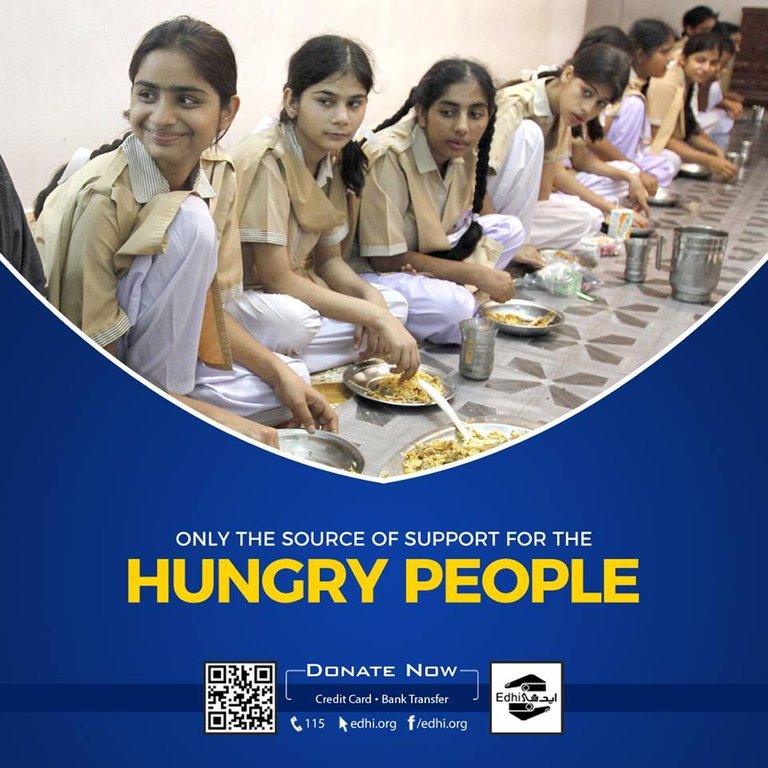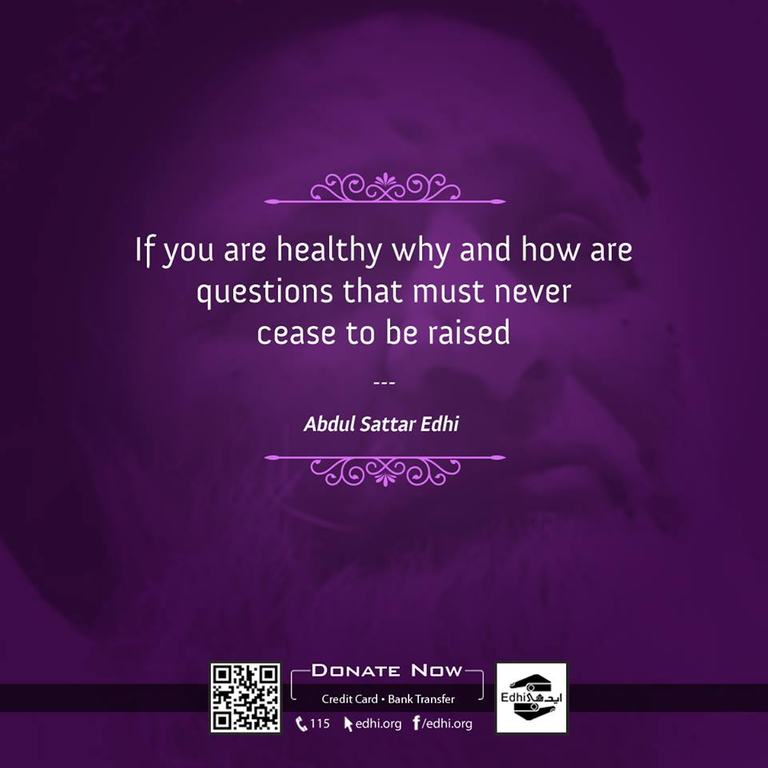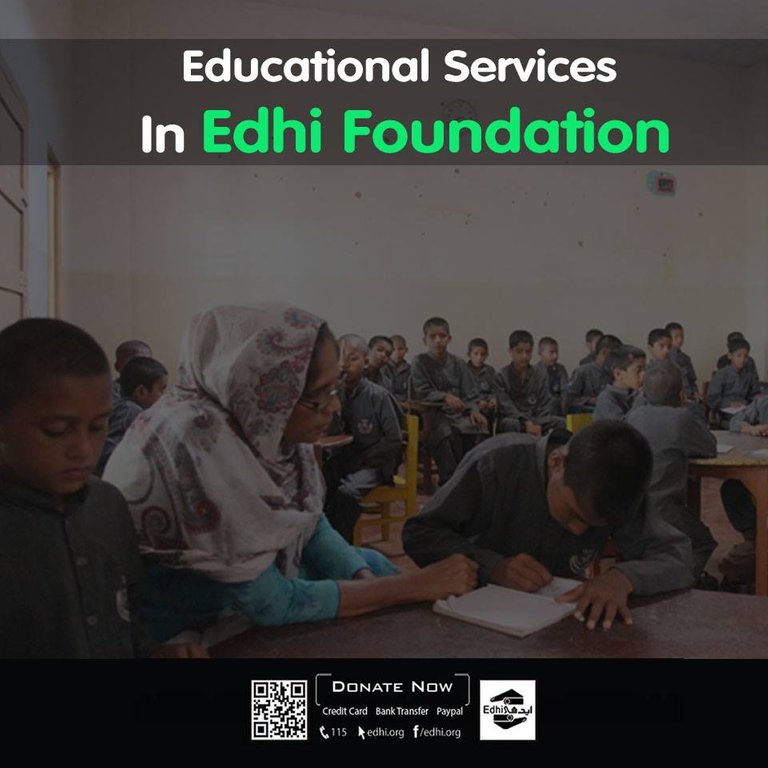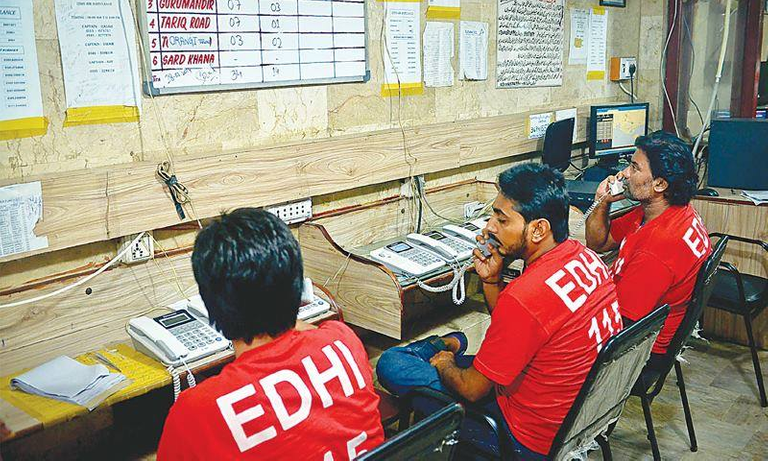History
In 1951 Abdul Sattar Edhi bought a small shop in Mithadar area of Karachi and opened a free dispensary. From that small beginning Edhi has built up the Edhi Foundation. Edhi established his first welfare center in 1957 and then the Edhi Trust.[5] What started as one man operating from a single room in Karachi is now the Edhi Foundation. The foundation has over 300 centers across the country, in big cities, small towns and remote rural areas, providing medical aid, family planning and emergency assistance. They own air ambulances, providing quick access to far-flung areas.

In Karachi alone, the Edhi Foundation runs 8 hospitals providing free medical care, eye hospitals, diabetic centres, surgical units, a 4- bed cancer hospital and mobile dispensaries. In addition to these the Foundation also manages two blood banks in Karachi. As with other Edhi services, employed professionals and volunteers run these. The foundation has a Legal aid department, which provides free services and has secured the release of countless innocent prisoners. Commissioned doctors visit jails on a regular basis and also supply food and other essentials to the inmates. There are 15 " Apna Ghar" ["Our Home"] homes for the destitute children, runaways, and psychotics.
On 25 June 2013, Edhi's kidneys failed; it was announced that he would be on dialysis for the rest of his life unless he found a kidney donor. Edhi died on 8 July 2016 at the age of 88 due to kidney failure after having been placed on a ventilator. His last wishes included the request that his organs were to be donated but due to his ill health, only his corneas were suitable. He was laid to rest at the Edhi Village Karachi.
The foundation also has an education scheme, which apart from teaching reading and writing covers various vocational activities such as driving, pharmacy and para-medical training. The emphasis is on self-sufficiency. The Edhi Foundation has branches in several countries where they provide relief to refugees in the United States, UK, Canada, Japan, and Bangladesh. In 1991 the Foundation provided aid to victims of the Gulf war and earthquake victims in Iran and Egypt. The organization has held the Guinness record for world's "largest volunteer ambulance organization" since 1997.[6] In 2016, after the death of Abdul Sattar Edhi, the state bank of Pakistan urged bank CEOs to donate to the foundation.[7]
Services
The Edhi Foundation provides a number of services, emergency and non-emergency, to the general public. In addition to emergency medical services and private ambulance services, the organization also renders aid to women and children in need, assists with missing persons cases, and helps in covering burial and graveyard costs of unclaimed and unidentified bodies during times of disaster and tragedy.[8]

Ambulance Services
As of March 2016, the Edhi Foundation owns over 1,800 private ambulance vans stationed in areas across Pakistan.[8] The ambulance dispatchers in Karachi, one of the busiest cities in Pakistan, have reported up to 6,000 calls a day, with the average response time for each incident falling within 10 minutes.[9] It was also an Edhi ambulance which responded to and picked up the body of the American journalist, Daniel Pearl, when he was killed in 2002.[9]
The organization also owns two private jets and one helicopter to assist in moving victims from hard-to-reach locations, especially during the event of a natural disaster.[10] In addition to land and air assistance, Edhi Foundation also hosts 28 rescue boats to aid during floods and in cases of shipwrecks and disaster along the Arabian Ocean coast.[11]
Hospital Services
The organization runs several private outpatient hospitals located in Pakistan. Additional medical facilities include a diabetic center, a nurse training center, immunization centers, and blood banks, including emergency banks during times of natural disasters or tragedies.[7]
Childcare Services
Bilquis Edhi, co-head of the Edhi Foundation, is responsible for overseeing children's and women's services within the organization. Services she heads currently for children include the jhoola (baby cradle) project, a child adoption center, and an abandoned children's welfare center. Jhoola is the Urdu word for "cradle".[12] Most of the Edhi emergency centers have a jhoola located outside the venue for mothers to leave their infants, regardless of the current situation they may be in.[13] These children are taken into custody and are taken care of, often being adopted by pre-screened families.
International Services
The Edhi Foundation has reached out to international communities and assisted with the setup of several offices overseas which assist with donations, fundraising, and especially financially aiding Pakistanis who have flown overseas in need of urgent medical attention. In addition to providing their regular services, the overseas foundation offices often help with community needs as necessary. In 2005, the Edhi Foundation provided $100,000 in aid to relief efforts following Hurricane Katrina.[9]

Hi! I am a robot. I just upvoted you! I found similar content that readers might be interested in:
https://en.wikipedia.org/wiki/Edhi_Foundation